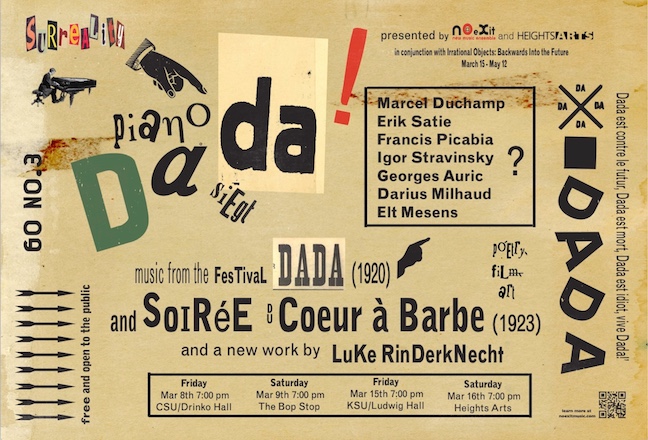by Max Newman

This week the ensemble continues their season-long, multifaceted exploration and celebration of surrealism. “Piano Dada with Shuai Wang” features music originally presented at the Festival Dada in 1920 and Soirée du Coeur à Barbe in 1923, including Marcel Duchamp’s Erratum Musical, Francis Picabia’s La Nourrice Americaine (fast and slow versions), and Elt Mesens’ Drie Composities Voor Klavier as well as an ensemble rendition of Erratum Musical and a new piece by Luke Rinderknecht.
Concerts take place on Friday, March 8 at Cleveland State University’s Drinko Hall, Saturday the 9th at the Bop Stop, Friday the 15th at Kent State University’s Ludwig Recital Hall, and Saturday the 16th at Heights Arts. All performances begin at 7:00 pm and are free of charge.
Beyer said that many of the pieces on the program were written by artists associated with the Dadaist movement of the early 1920s, which sought to turn traditional artistic understanding on its head.
“Dadaism came out of surrealism. It was a reaction to the war and all the horrors that came with that. And there was a feeling, not just amongst Dadaists, but among all modern art movements that spawned at that time, that society was not working. It was a sick, broken system. So the Dadaists sought to basically oppose and confront and lampoon that, and do so with great absurdity.”
This movement will be reflected in several different ways during the program. “Some of these pieces were written by wonderful traditional composers. But then you have pieces that were not written by traditional composers and aren’t constructed in a traditional way — they’re more of an extension of artistic experimentation. So the music itself is all great, but some of it is very conceptual.”
“Piano Dada” will also include Three Poems by Gunnar Owen-Hirthe, James Praznik, and Timothy Beyer, and the world premiere of a Moon fight hearing aid by No Exit percussionist and composer Luke Rinderknecht.
Beyer said that no artistic movement has continued to be relevant and evolving like surrealism. “Part of what No Exit does — in addition to presenting new music — is looking back at what was the avant-garde, which in many cases is still far more avant-garde than what we see today,” Beyer said. “People often forget the wild things that aren’t of our own time.”
Click here to read No Exit’s Laura King in conversation with Shuai Wang.
As with every program during this season-long series, there will also be an accompanying art installation.
Irrational Objects: Backwards Into the Future takes its inspiration from the many fantastical and utterly illogical objects created by the Dadaists and Surrealists in the opening decades of the 20th century. The concept behind the exhibition is two-fold: using the ideas and methods of the original Dadaists and Surrealists as a roadmap of sorts, the exhibit seeks to pay homage to the world that these iconoclastic artists conjured while also presenting something timely and relevant that speaks to our current age and circumstances — making the connections between what was and what is. Abounding with the absurd, the unexpected, and the uncanny, it is our hope that Irrational Objects: Backwards Into the Future will serve to, in a thoughtful manner, enlighten, entertain, and amuse those who experience the installation.
The exhibit will be open to the public starting on March 15 and will run through May 12 at Heights Arts. (Pictured: Fruit Basket by Timothy Beyer)
Published on ClevelandClassical.com March 6, 2024.
Click here for a printable copy of this article



